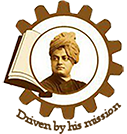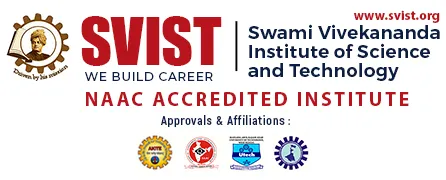Introduction:
The Department of Electronics and Communication Engineering (ECE) was established in 2008 to encourage research in this subject and provide young students with the technical expertise and professional skills needed to address the challenges in this quickly expanding field.With 14 highly qualified, experienced and dedicated faculty members, the ECE department is a dynamic and vibrant one that fosters the professional development of young, aspiring engineers.Faculty members are not only teaching but also moulding young students as professionals.
HOD Message:
Warm Greetings to Everyone.
Welcome to the Department of Electronics & Communication Engineering at Swami Vivekananda Institute of Science & Technology, Dakshin Gobindapur, Kolkata, West Bengal. The Department was established in the year 2008 to provide leadership in the field of Electronics & Communication Engineering with an intake of 60 students, and the current intake is 90 students.
Engineers are responsible for creating the modern world, and one of their most fascinating disciplines is Electronics and Communication Engineering, which provides excellent career opportunities in various areas of technology.
ELECTRONICS is at the nexus of hardware and software, allowing students to gain knowledge across a broad range of topics such as communication systems, VLSI design, embedded systems, digital signal processing, controls systems, electromagnetic fields and waves, antennas, microwaves and radars, microprocessors and microcontrollers, Robotics, IOT, etc. We strive to train and empower our students who will make the world a better place by using the power of engineering principles, techniques and systems. As a result, technologies like cars, aeroplanes, mobile phones, smartphones, surgical robots, etc., are improved and made safer.
The Department offers a great environment for learning and growth since it has a nice mix of experienced faculties with PhDs and young, very effective faculty members, the majority of whom are engaged in research and have extensive teaching experience. Many faculty members have published numerous research papers in esteemed national and international journals and a few patents.
The department has a top-notch infrastructure that can handle all the labs and experiments that go above and beyond, stipulated by the university curriculum. To keep pace with the compatibility of industry requirements, students regularly undergo skill development workshops and add-on or value-added courses in the department. Apart from these, there are also Seminars and Guest Lecture talks from top academicians and industrial experts.The students can be includedin different types of clubs like photography, Music, Arts, Sports, etc.
The department encourages internships outside of the academic curriculum and regularly organizes industry visits. The students who graduated from this institution were given lucrative jobs, and several of them went on to earn higher degrees at reputable universities in India and overseas.
After completing the engineering education, there are several opportunities to start a job. A student can pursue a career in a variety of fields, including information technology (IT), defence, telecommunications, electronics, and hardware manufacturing, embedded systems development, software development, the TV and music industries, power generation, space communications, home appliances development, mobile phones testing and development, communication protocols development, and optical communications development. Therefore, a graduate ofElectronics and Communication Engineering can also aspire for a global employment opportunity. These different businesses all work more or less similarly around the world.
I appreciate the management’s excellent facilities and unrestricted support for all of our activities.
In a nutshell, with all-around facilities, a study journey in the SVIST ECE department will lead to a very fruitful career in your life.

To become a well-known department by offering students a top-notch environment for academics and skill development in the field of Electronics and Communication Engineering to meet industrial and societal needs.

M1:To provide a student-centric learning environment, impart profound knowledge in the theoretical and practical aspects of Electronics and Communication Engineeringand empower the students to meet Industry Standards.
M2: Establish state-of-the-art facilities for design and simulation.
M3:To cultivate enhanced teamwork, communication, leadership, and team-building abilities while placing a high importance on moral principles.
Program Educational Objectives (PEOs)
PEO 1: Graduates will demonstrate their knowledge in the field of Electronics and Communication Engineering and allied Engineering field.
PEO 2:Graduates will contribute to interdisciplinary studies with theuseofmodern tools & emergingtechnologies.
PEO 3:Graduates will possess the necessary foundation required to take up gainful employment in the core and allied sectors or prepare them for a successful career and work professionally to meet the technical acquaintance, following moral principles.
Program Specific Outcomes (PSOs)
PSO 1: Analyze specific engineering problems relevant to Electronics and Communication Engineering by applying the knowledge of basic sciences, engineering mathematics and engineering fundamentals, along with societal and ethical responsibility.
PSO 2: Design systems containing electronic devices (hardware) and software simulation using significant analytical knowledge in Electronics and Communication Engineering and allied fields and applying modern tools to achieve a successful career in addressing real-world applications and to function as an individual as well as a team member by demonstrating positive attitudes.

